Where is the Best Place to Buy Jamaican Blue Mountain Coffee?
- Updated on: March 7, 2024
- Written by: Aimee Bennett
Aimee is a coffee enthusiast and has worked in the coffee industry for years. She sources coffee beans from around the world and her coffee journey began in… (read more).
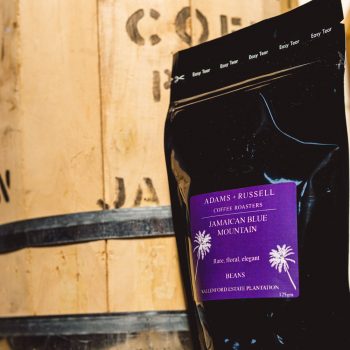
Jamaican Blue Mountain Coffee
The Blue Mountain range has an elevation of 2,256m and is home to Jamaica’s highest point; the Blue Mountain Peak.
It has one of the steepest gradients in the whole world, as the rise from the coast to its highest point takes place over only just 16 kilometres.
The temperature here varies from 27°C at sea level to 5°C at its peak.
Jamaican Blue Mountain Coffee is a globally protected certification mark. This means that companies can only label their products with this title once certified by the Coffee Industry Board of Jamaica.
But, why are these beans the most sought-after in the world? What makes them so expensive?
Keep reading to discover the answers and more information about this fascinating product.
RELATED PRODUCTS
-
Jamaica Blue Mountain
- £27.00 – £210.00
- Select options
-
V60 Coffee Maker
- £6.00 – £7.20
- Select options
What is Genuine Jamaican Blue Mountain Coffee?
As it is so popular yet so rare, there are plenty of fakes on the market. Unfortunately, some people will slap on a ‘Blue Mountain’ label on a cheap bag to scam customers.
Our advice is to only purchase from reputable shops and if the price seems too good to be true, it probably is.
The Coffee Industry Regulation Act specifies what coffee can use this label.
Also, remember that only small amounts are produced every year, so any supplier that claims to have huge quantities is most likely selling fake Blue Mountain.
What Makes Jamaican Blue Mountain So Special?
Compared to other countries, this country’s growing region is very small. This is why it is so scarce. Also, around 80% of it gets exported to Japan, which makes it even harder to find in the UK.
The growing conditions are like no other. As previously mentioned, the temperatures can be as high as 27°C at the bottom of the mountain and as low as 5°C at the top. The plants are also grown in volcanic soil, which adds the fantastic flavour.
These conditions can make growing time as long as 10 months, which is around double the time of most other countries coffee.
Harvesting the plant is extremely labour intensive. There are no large, flat growing areas in the mountains and it can be quite dangerous to pick the cherries from these plants.
Between the high gradients, wet slopes and uneven ripening time, harvesting can be very intense.
Once the beans have finally been harvested, they then go through rigorous quality control. When they are in their green state, they are categorised by size and any defected beans are removed.
Around 85% of beans are chosen for export, with the rest being disregarded because of faults.
Jamaican Blue Mountain Coffee is a globally protected certification mark.
The Best Quality Coffee – Ground or Beans
This country is unique because of the extreme lengths they go to in order to maintain the quality of their Jamaican Blue Mountain beans.
Once it goes through the first stage of quality control, that is not the end. It then has to go through a second stage, which is even more thorough than the last.
Blue Mountain is such a prestigious title that only the very best beans get to hold it.
Jamaica’s Industry Board doesn’t just educate and set strict guidelines on how beans are grown, harvested, processed and roasted, they also enforce a compulsory taste test.
If a coffee farm wants to export it’s products, then the coffee must be thoroughly tested by the Industry Board and must receive approval.
Coffee Detective tells us that even before tasting, 3 members of the board will inspect the beans in their green state and when roasted. Once they have approved the appearance, they will then taste it.
They taste each coffee without knowing where it is from or who produced it and then fill out a complex evaluation form, where they will score it on these characteristics:
- Colour
- Roast
- Aroma
- Acidity
- Body
- After taste
- Other flavours
It is clear to see why Jamaican Blue Mountain has such consistent quality and why the price tag is higher than most other coffees on the market.
This challenging and time-consuming process is more than evident in the final result as the taste of these beans is unlike any other.
Jamaican Blue Mountain Coffee Recipe
As this coffee is so delicious it makes a fantastic ingredient in recipes. If you are a coffee lover like us, experiment with adding it into all kinds of recipes to give your favourite dishes an exciting twist.
We love this blog post ‘Get Your Coffee Fix With 25 Unexpected Recipes’, it has some great inspiration to get you started.
We have found two fantastic recipes where you can experience the exquisite taste of Jamaican Blue Mountain.
Jamaican Coffee Cake
The first one is from JamaFo, which specialises in Jamaican food. The measurements on this website are in American units, so we have slightly altered it below.
You will need:
- 384g all purpose flour
- 43g grounded coffee
- 1 tablespoon baking powder
- 1/2 teaspoon salt
- 201g sugar
- 1 medium egg
- 250ml milk
- 3 tablespoons Margarine, melted
- 1 teaspoon vanilla
Ingredients for Topping:
- 2 tablespoons Margarine, melted
- 2 tablespoons sugar
- 1/2 teaspoon cinnamon powder
- 1/2 cup(s) breadcrumbs or cornflakes
- 2 tablespoon(s) peanuts, chopped
- Combine flour, coffee, baking powder, salt and sugar. Mix well and set aside.
- Combine egg, milk, melted margarine (which was allowed to cool) and vanilla; mix well.
- Make a well in the centre of the flour mixture and pour in the liquid mixture. Mix quickly and lightly.
- Scrape the batter into a lightly greased baking tin.
- Combine all the ingredients for the topping and mix well. Sprinkle topping evenly over the surface of the batter.
- Bake for 45-50 minutes or until a skewer inserted, comes out clean.
Tia Maria Espresso Martini Cocktail
Many of you may not know that the flavour of Tia Maria, the delicious coffee liqueur, is based on the Jamaican Blue Mountain beans. They have a great recipe for an espresso martini.
So, enjoy this cocktail while tasting the distinctive flavour of these beans.
You will need:
- 25ml Tia Maria
- 25ml Vodka
- Double or Single Shot of Espresso
- 5ml Sugar Syrup
- Fill your glass with ice and allow to chill.
- Pour the Tia Maria, vodka and espresso into a cocktail shaker.
- Fill the rest with ice and shake.
- Take the ice out of your glass and pour the cocktail into it using a strainer or sieve.
- Sprinkle some coffee beans on top for decoration.
Compared to other countries that grow coffee, Jamaica’s growing region is very small
Where is the best place to buy coffee beans online?
As Jamaican Blue Mountain is one of the worlds most sought-after coffees, there are plenty of fakes on the market. That is why it is so important to buy from a trusted supplier that can provide certification and the Jamaican Blue Mountain stamp.
Once you have found a trusted supplier, you still could be getting poor quality beans. Here are 5 tips for finding the best places online to buy your beans:
- Making sure it’s fresh. This can be difficult to check with some suppliers, but buying from a local roaster is the best way to make sure the beans are fresh. A few weeks after roasting, they will lose flavour and go stale. Similar products from large retailers that have huge quantities stored on shelves for weeks won’t have the best flavour.
- Get the right options. Go for a supplier that gives you options of grounds or beans. Grinding your own beans at home is the best way to get the freshest, which is what we’d recommend for the Jamaican Blue Mountain.
- Demand detail. Avoid suppliers that are vague about their products and won’t offer any information about origin, harvesting, roasting or processing. This is most likely because they don’t know themselves, which is a big indicator for poor quality.
- Roasting. This plays a huge role in the quality of your beans. It’s important to start with high quality coffee, but it can easily get ruined in the roasting process. At Adams and Russell, we only hand roast in small batches to ensure the best quality possible. Quality is lost in large batches as it is harder to monitor an even roast.

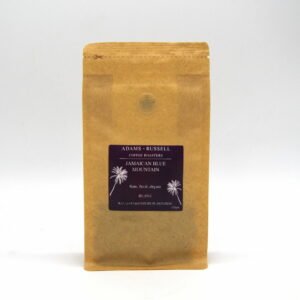
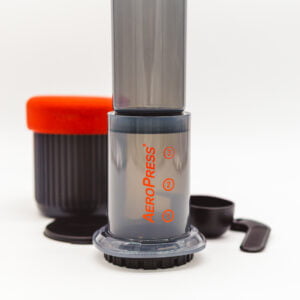
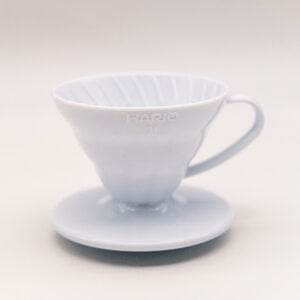



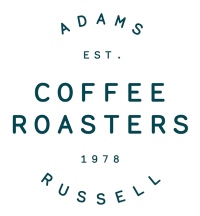
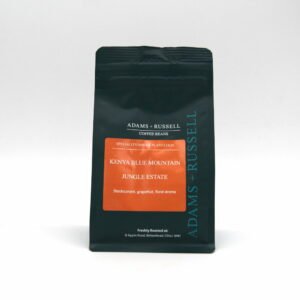
This Post Has 2 Comments
Would these be wasted when brewed as an espresso?
I recently tried pulling a shot with Blue mountain and also put some in my moka on the stove. Let me say they were both excellent, totally smooth and no bitterness at all so no, I can’t say that either was a waste.